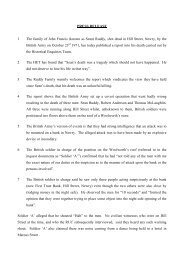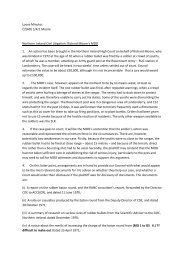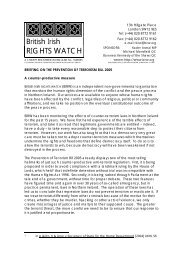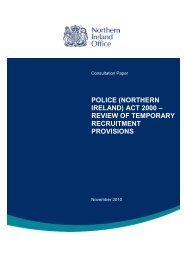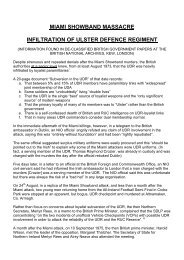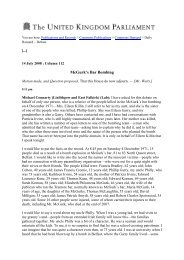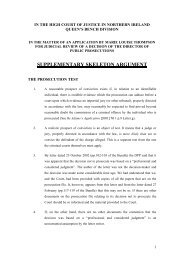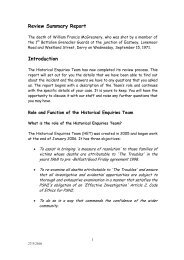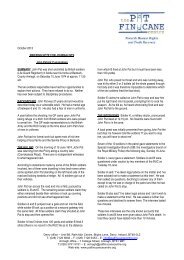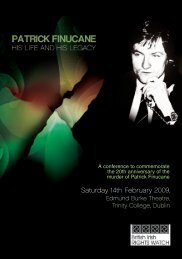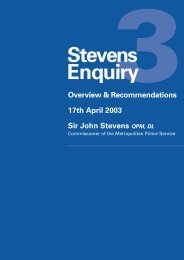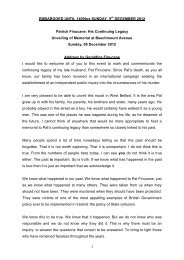Patrick Shanaghan v the United Kingdom - The Pat Finucane Centre
Patrick Shanaghan v the United Kingdom - The Pat Finucane Centre
Patrick Shanaghan v the United Kingdom - The Pat Finucane Centre
You also want an ePaper? Increase the reach of your titles
YUMPU automatically turns print PDFs into web optimized ePapers that Google loves.
12 SHANAGHAN v. THE UNITED KINGDOM JUDGMENT<br />
Coroner during <strong>the</strong> inquest. Coroners generally adopted <strong>the</strong> practice of<br />
disclosing <strong>the</strong> statements or documents during <strong>the</strong> inquest proceedings, as<br />
<strong>the</strong> relevant witness came forward to give evidence.<br />
55. Following <strong>the</strong> recommendation of <strong>the</strong> Stephen Lawrence Inquiry,<br />
Home Office Circular No. 20/99 (concerning deaths in custody or deaths<br />
resulting from <strong>the</strong> actions of a police officer in purported execution of his<br />
duty) advised Chief Constables of police forces in England and Wales to<br />
make arrangements in such cases for <strong>the</strong> pre-inquest disclosure of<br />
documentary evidence to interested parties. This was to “help provide<br />
reassurance to <strong>the</strong> family of <strong>the</strong> deceased and o<strong>the</strong>r interested persons that a<br />
full and open police investigation has been conducted, and that <strong>the</strong>y and<br />
<strong>the</strong>ir legal representatives will not be disadvantaged at <strong>the</strong> inquest”. Such<br />
disclosure was recommended to take place 28 days before <strong>the</strong> inquest.<br />
56. Paragraph 7 of <strong>the</strong> Circular stated:<br />
“<strong>The</strong> courts have established that statements taken by <strong>the</strong> police and o<strong>the</strong>r<br />
documentary material produced by <strong>the</strong> police during <strong>the</strong> investigation of a death in<br />
police custody are <strong>the</strong> property of <strong>the</strong> force commissioning <strong>the</strong> investigation. <strong>The</strong><br />
Coroner has no power to order <strong>the</strong> pre-inquest disclosure of such material... Disclosure<br />
will <strong>the</strong>refore be on a voluntary basis.”<br />
Paragraph 9 listed some kinds of material which require particular<br />
consideration before being disclosed, for example:<br />
– where disclosure of documents might have a prejudicial effect on<br />
possible subsequent proceedings (criminal, civil or disciplinary);<br />
– where <strong>the</strong> material concerns sensitive or personal information about<br />
<strong>the</strong> deceased or unsubstantiated allegations which might cause distress to<br />
<strong>the</strong> family; and<br />
– personal information about third parties not material to <strong>the</strong> inquest.<br />
Paragraph 11 envisaged that <strong>the</strong>re would be non-disclosure of <strong>the</strong><br />
investigating officer’s report although it might be possible to disclose it in<br />
those cases which <strong>the</strong> Chief Constable considered appropriate.<br />
B. Police Complaints Procedures<br />
57. <strong>The</strong> police complaints procedure was governed at <strong>the</strong> relevant time<br />
by <strong>the</strong> Police (Nor<strong>the</strong>rn Ireland) Order 1987 (<strong>the</strong> 1987 Order). This replaced<br />
<strong>the</strong> Police Complaints Board, which had been set up in 1977, by <strong>the</strong><br />
Independent Commission for Police Complaints (<strong>the</strong> ICPC). <strong>The</strong> ICPC has<br />
been replaced from 1 October 2000 with <strong>the</strong> Police Ombudsman for<br />
Nor<strong>the</strong>rn Ireland appointed under <strong>the</strong> Police (Nor<strong>the</strong>rn Ireland) Act 1998.<br />
58. <strong>The</strong> ICPC was an independent body, consisting of a chairman, two<br />
deputy chairmen and at least four o<strong>the</strong>r members. Where a complaint<br />
against <strong>the</strong> police was being investigated by a police officer or where <strong>the</strong><br />
Chief Constable or Secretary of State considered that a criminal offence



